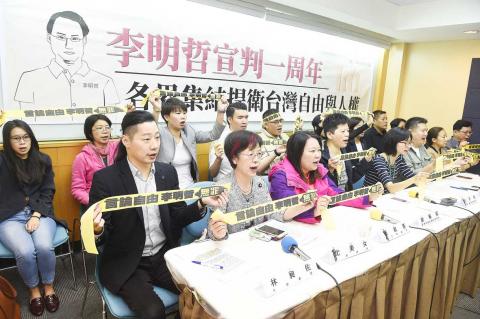A coalition of civil groups yesterday called for the immediate release of human rights advocate Lee Ming-che (李明哲) and urged the government to continue pressuring China on the issue, after an application by Lee’s wife, Lee Ching-yu (李凈瑜), to visit her husband was rejected by the Chinese government earlier this month.
“It has been exactly one year since Lee was sentenced to prison and we urge the Taiwanese government to continue taking measures to demand his release,” Taiwan Association for Human Rights secretary-general Chiu Ee-ling (邱伊翎) told a Taipei news conference jointly held by the association, Amnesty International, Covenants Watch and other groups.
Taipei Mayor Ko Wen-je (柯文哲) should use the Dec. 20 twin-city forum between Taipei and Shanghai as an opportunity to lodge a protest with Beijing over the way Chinese authorities arbitrarily transferred Lee to different prisons and denied visitation rights to his family members, she said.

Photo: Chen Chih-chu, Taipei Times
The groups have previously called on the Taiwanese delegation to the APEC summit to demand Lee’s release when meeting Chinese President Xi Jinping (習近平) earlier this month, but the delegation did not mention anything about Lee throughout the summit, Chiu added.
Lee was on Nov. 28 last year sentenced to five years in prison for “subversion of state power” after holding online lectures on democracy and helping families of jailed dissidents in China.
He was arrested in March last year when entering China from Macau, and yesterday was the 619th day of his detention, Chiu said.
Authorities had allowed Lee’s family to visit him five times since March, but have stopped allowing visits since September, she said.
In October, the family received indirect information that Lee had been transferred to another prison, although no explanation was given, she said, adding: “There is absolutely no information about him at the moment and that raises concerns about his well-being.”
Chiu also mentioned a referendum that sought to change the national team’s name from “Chinese Taipei” to “Taiwan,” which was rejected on Saturday.
“Many foreign media outlets have interpreted the election results as an indication that Taiwan is leaning toward China, but we are here today to show that Taiwanese will defend their freedom of speech and human rights, that we will not approve of Beijing’s values and disregard for human rights,” she said.
Her view was echoed by Democratic Progressive Party Legislator Yu Mei-nu (尤美女), who vowed to continue voicing support for Lee and calling for his release “until the day he is freed.”

The High Prosecutors’ Office yesterday withdrew an appeal against the acquittal of a former bank manager 22 years after his death, marking Taiwan’s first instance of prosecutors rendering posthumous justice to a wrongfully convicted defendant. Chu Ching-en (諸慶恩) — formerly a manager at the Taipei branch of BNP Paribas — was in 1999 accused by Weng Mao-chung (翁茂鍾), then-president of Chia Her Industrial Co, of forging a request for a fixed deposit of US$10 million by I-Hwa Industrial Co, a subsidiary of Chia Her, which was used as collateral. Chu was ruled not guilty in the first trial, but was found guilty

DEADLOCK: As the commission is unable to forum a quorum to review license renewal applications, the channel operators are not at fault and can air past their license date The National Communications Commission (NCC) yesterday said that the Public Television Service (PTS) and 36 other television and radio broadcasters could continue airing, despite the commission’s inability to meet a quorum to review their license renewal applications. The licenses of PTS and the other channels are set to expire between this month and June. The National Communications Commission Organization Act (國家通訊傳播委員會組織法) stipulates that the commission must meet the mandated quorum of four to hold a valid meeting. The seven-member commission currently has only three commissioners. “We have informed the channel operators of the progress we have made in reviewing their license renewal applications, and

Taiwan People’s Party (TPP) Chairman Huang Kuo-chang (黃國昌) yesterday appealed to the authorities to release former Taipei mayor Ko Wen-je (柯文哲) from pretrial detention amid conflicting reports about his health. The TPP at a news conference on Thursday said that Ko should be released to a hospital for treatment, adding that he has blood in his urine and had spells of pain and nausea followed by vomiting over the past three months. Hsieh Yen-yau (謝炎堯), a retired professor of internal medicine and Ko’s former teacher, said that Ko’s symptoms aligned with gallstones, kidney inflammation and potentially dangerous heart conditions. Ko, charged with

Taiwan-based publisher Li Yanhe (李延賀) has been sentenced to three years in prison, fined 50,000 yuan (US$6,890) in personal assets and deprived political rights for one year for “inciting secession” in China, China's Taiwan Affairs Office spokesman Chen Binhua (陳斌華) said today. The Shanghai First Intermediate People’s Court announced the verdict on Feb. 17, Chen said. The trial was conducted lawfully, and in an open and fair manner, he said, adding that the verdict has since come into legal effect. The defendant reportedly admitted guilt and would appeal within the statutory appeal period, he said, adding that the defendant and his family have